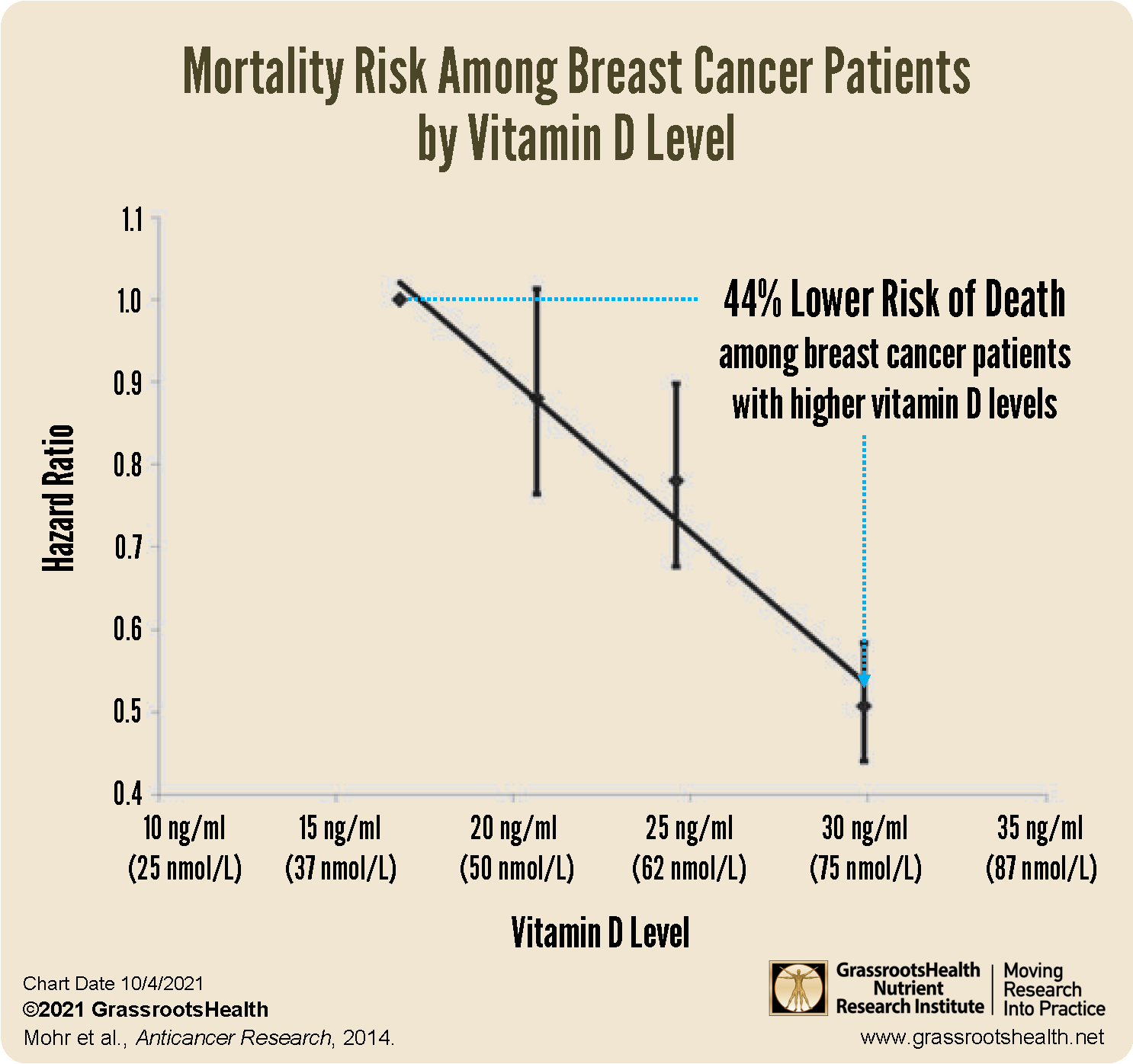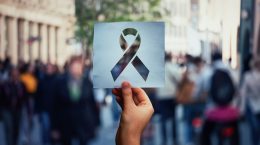Published on October 5, 2021
Fatality rate cut in half for breast cancer patients with the highest vitamin D levels compared to those with the lowest vitamin D levels
Key Points
- Research has shown an 82% lower rate of getting breast cancer among women with vitamin D levels of at least 60 ng/ml (150 nmol/L) versus below 20 ng/ml (50 nmol/L)
- At the time of diagnosis, women whose vitamin D level was 30 ng/ml (75 nmol/L) or higher had a 27% lower risk of death compared to women whose vitamin D level was below 20 ng/ml (50 nmol/L)
- Another study showed that breast cancer patients with the highest vitamin D levels (average of 30 ng/ml or 75 nmol/L) after diagnosis had a 44% lower risk of breast cancer related death compared to those with the lowest vitamin D levels (an average of 17 ng/ml or 42 nmol/L)
 Every October, GrassrootsHealth celebrates Breast Cancer Prevention, and reviews the overwhelming evidence showing the significant relationship between higher vitamin D levels and a lower risk of getting breast cancer. In fact, a paper published by GrassrootsHealth showing an 82% lower rate of breast cancer among women with vitamin D levels of at least 60 ng/ml (150 nmol/L) versus women with vitamin D levels below 20 ng/ml (50 nmol/L) was recently labeled among the top 10% most cited papers in 2018 for that journal. This is true PREVENTION!
Every October, GrassrootsHealth celebrates Breast Cancer Prevention, and reviews the overwhelming evidence showing the significant relationship between higher vitamin D levels and a lower risk of getting breast cancer. In fact, a paper published by GrassrootsHealth showing an 82% lower rate of breast cancer among women with vitamin D levels of at least 60 ng/ml (150 nmol/L) versus women with vitamin D levels below 20 ng/ml (50 nmol/L) was recently labeled among the top 10% most cited papers in 2018 for that journal. This is true PREVENTION!
Vitamin D Levels at Diagnosis Related to Breast Cancer Survival
Research from Roswell Park Comprehensive Cancer Center and Kaiser Permanente by Yao et al., Clinically sufficient vitamin D levels at breast cancer diagnosis and survival outcomes in a prospective cohort of 3,995 patients after a median follow-up of 10 years, summarized initial findings from Kaiser Permanente Northern California’s Pathways Study, involving women diagnosed with incident invasive breast cancer between 2006 and 2013, and their risk of death. This study found that women whose vitamin D level at the time of diagnosis was 30 ng/ml (75 nmol/L) or higher had a 27% lower risk of death compared to women whose vitamin D level was below 20 ng/ml (50 nmol/L).
Could Achieving Higher Vitamin D Levels After a Breast Cancer Diagnosis Still Provide a Benefit?
The findings by Yao et al. are similar to those from a review published in 2014 by a group out of the University of California, San Diego. Mohr et al., along with GrassrootsHealth’s Principle Investigator Dr. Cedric Garland, completed an analysis of five studies, which included a total of 4,443 breast cancer patients, to determine the relationship between vitamin D level and breast cancer survival among women already diagnosed with breast cancer. When looking at the combined data, higher vitamin D levels were related to substantially lower rates of death from breast cancer. Compared to patients in the group with the lowest vitamin D levels (an average of 17 ng/ml or 42 nmol/L), breast cancer patients in the group with the highest vitamin D levels (average of 30 ng/ml or 75 nmol/L) had a 44% lower risk of breast cancer related death. (p<0.0001)
In fact, when looking at the direct relationship between vitamin D level and breast cancer fatality, the vitamin D level accounted for 97% of the variance. This means that when considering other factors that may influence breast cancer mortality, the vitamin D level made almost all the difference.
Give Vitamin D a Chance – No Matter What Stage of Life You Are In
Deficiency of vitamin D, at any age or any stage of life, will not benefit health, and can only bring potential harm. Avoid deficiency at all costs – test your levels today and take the steps necessary to achieve a target level you see fit for your health.
The Importance of Getting Enough of All Nutrients
 Having and maintaining healthy vitamin D levels and other nutrient levels can help improve your health now and for your future. Choose which to measure, such as your vitamin D, omega-3s, and essential minerals including magnesium and zinc, by creating your custom home test kit today. Take steps to improve the status of each of these measurements to benefit your overall health. You can also track your own intakes, symptoms and results to see what works best for YOU.
Having and maintaining healthy vitamin D levels and other nutrient levels can help improve your health now and for your future. Choose which to measure, such as your vitamin D, omega-3s, and essential minerals including magnesium and zinc, by creating your custom home test kit today. Take steps to improve the status of each of these measurements to benefit your overall health. You can also track your own intakes, symptoms and results to see what works best for YOU.
Enroll and test your levels today, learn what steps to take to improve your status of vitamin D (see below) and other nutrients and blood markers, and take action! By enrolling in the GrassrootsHealth projects, you are not only contributing valuable information to everyone, you are also gaining knowledge about how you could improve your own health through measuring and tracking your nutrient status, and educating yourself on how to improve it.
Help everyone Move Research into Practice with vitamin D and other nutrients! As a special birthday gift to everyone, in honor of the science, we have created a special scholarship fund for anyone to donate to that will go towards helping others participate. Your donation will allow anyone to get help with funding their participation when they need it.
Text-to-give: Text Daction to 44321 to add to our Scholarship Fund.


 Click to Enlarge & Print
Click to Enlarge & Print


